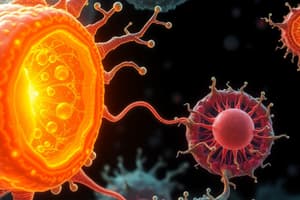Podcast
Questions and Answers
What is the main focus of cell biology?
What is the main focus of cell biology?
- The communication between cells through the use of chemical substances
- The study of evolution
- The structure, function, and organization of cells (correct)
- The study of life and living organisms
What separates cells from their environment?
What separates cells from their environment?
- Nucleus
- Mitosis
- Membrane (correct)
- Endoplasmic reticulum
Which process involves the replication of genetic material and the separation of chromosomes?
Which process involves the replication of genetic material and the separation of chromosomes?
- Metabolism
- Cellular transport
- Mitosis (correct)
- Signaling
What is the movement of molecules across cell membranes called?
What is the movement of molecules across cell membranes called?
Which branch of biology seeks to understand the complexity of living systems?
Which branch of biology seeks to understand the complexity of living systems?
What are the building blocks of all living organisms?
What are the building blocks of all living organisms?
What is the driving force of evolution?
What is the driving force of evolution?
Which aspect of evolution reflects in the similarities in the DNA and other characteristics of living organisms?
Which aspect of evolution reflects in the similarities in the DNA and other characteristics of living organisms?
What is the process by which new species arise from existing ones?
What is the process by which new species arise from existing ones?
Which concept in evolution helps species better survive and reproduce in their environments, such as camouflage and protective coloration?
Which concept in evolution helps species better survive and reproduce in their environments, such as camouflage and protective coloration?
What is the central concept in biology that helps explain the diversity of life on Earth?
What is the central concept in biology that helps explain the diversity of life on Earth?
Flashcards are hidden until you start studying
Study Notes
Biology
Biology is the study of life and living organisms, encompassing various branches of science that seek to understand the complexity of living systems. The two main subtopics within biology are cell biology and evolution.
Cell Biology
Cell biology is a branch of biology that focuses on the structure, function, and organization of cells, which are the basic units of life. Cells are the building blocks of all living organisms, and understanding their properties and behaviors is essential for understanding life itself. Key aspects of cell biology include:
-
Cell Structure: Cells have a membrane that separates them from their environment, and they have different compartments, such as the nucleus, mitochondria, and endoplasmic reticulum, which carry out specific functions.
-
Cell Division: Cells can divide to produce new cells, which is essential for growth and development. This process, known as mitosis, involves the replication of genetic material and the separation of chromosomes.
-
Cellular Processes: Cells carry out various processes, such as metabolism (the chemical reactions that occur within cells to produce energy and maintain cellular functions), signaling (the communication between cells through the use of chemical substances called hormones), and cellular transport (the movement of molecules across cell membranes).
Evolution
Evolution is the process by which species change over time through natural selection and other mechanisms. It is a central concept in biology, as it helps explain the diversity of life on Earth. Key aspects of evolution include:
-
Common Descent: All living organisms share a common ancestor, and this ancestry is reflected in the similarities in their DNA and other characteristics.
-
Natural Selection: This is the driving force of evolution, as individuals with traits that improve their chances of survival and reproduction are more likely to pass those traits on to their offspring.
-
Adaptation: Over time, species develop traits that help them better survive and reproduce in their environments, such as camouflage, protective coloration, or the ability to fly.
-
Speciation: This is the process by which new species arise from existing ones, either through the formation of reproductively isolated populations or the development of new physical or behavioral traits.
In conclusion, biology is a vast and diverse field of study that encompasses cell biology and evolution. Understanding these subtopics helps us appreciate the complexity and diversity of life on Earth.
Studying That Suits You
Use AI to generate personalized quizzes and flashcards to suit your learning preferences.




